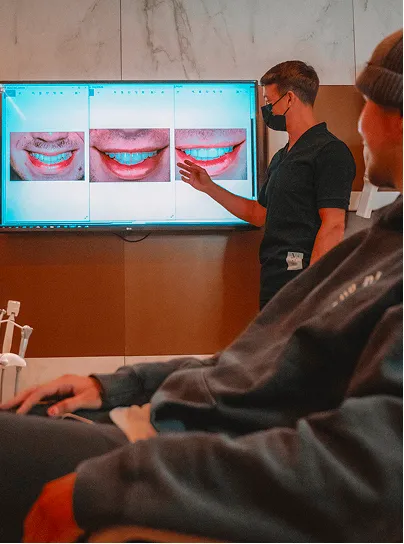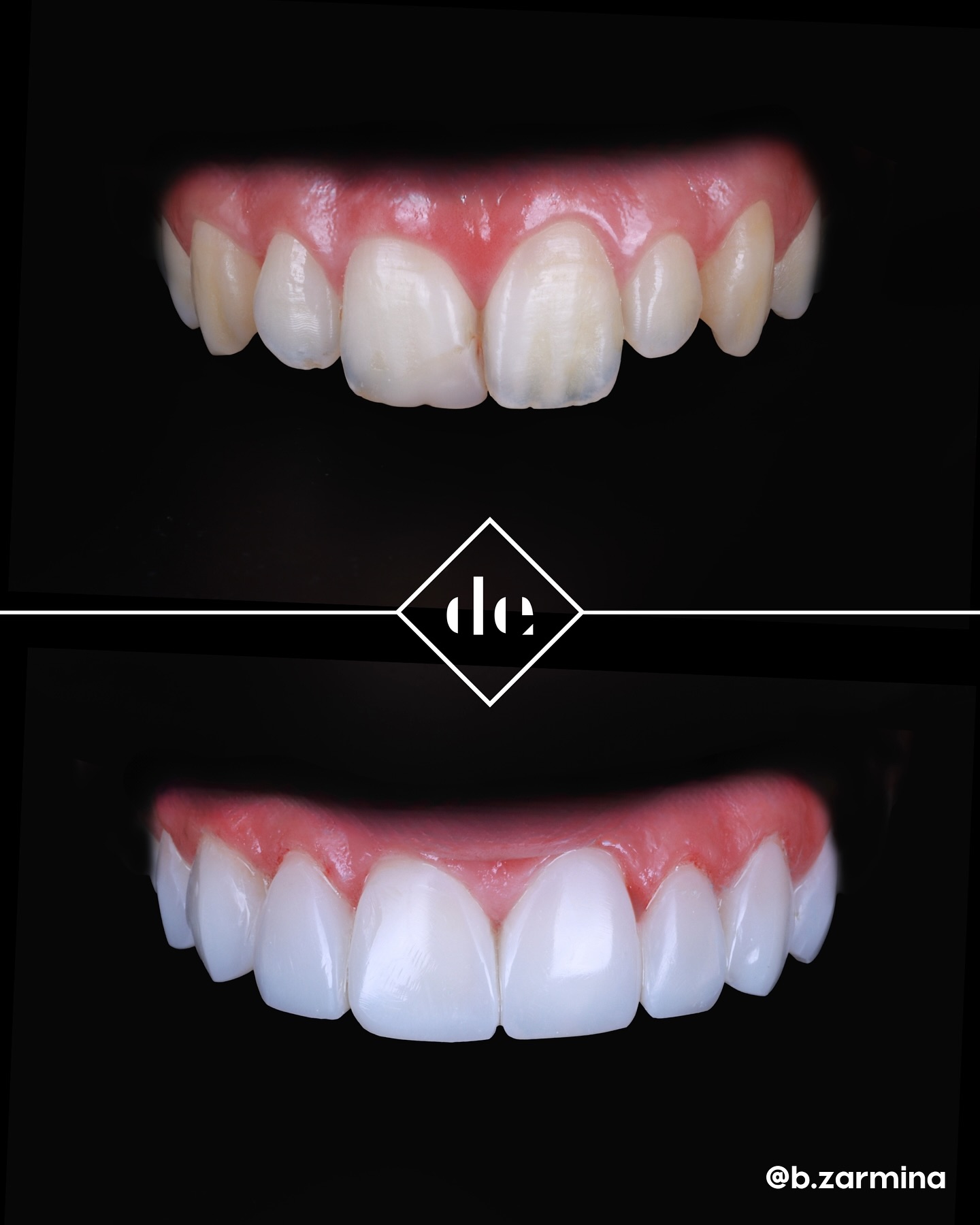Invisalign for just £1,000 and more Open Day offers...
Don’t miss our Same Day Smile Open Day - with exclusive pricing on veneers, Invisalign & implants for one day only.
Spaces are filling fast - secure yours now.

Root canal treatment at Dental Excellence in Liverpool and Chelsea
Restore and protect your natural smile with root canal treatment, an advanced procedure that relieves pain, preserves your tooth, and supports long-term oral health with precision and care.

- Options for sedation
- Endodontic specialists
- Flexible finance available
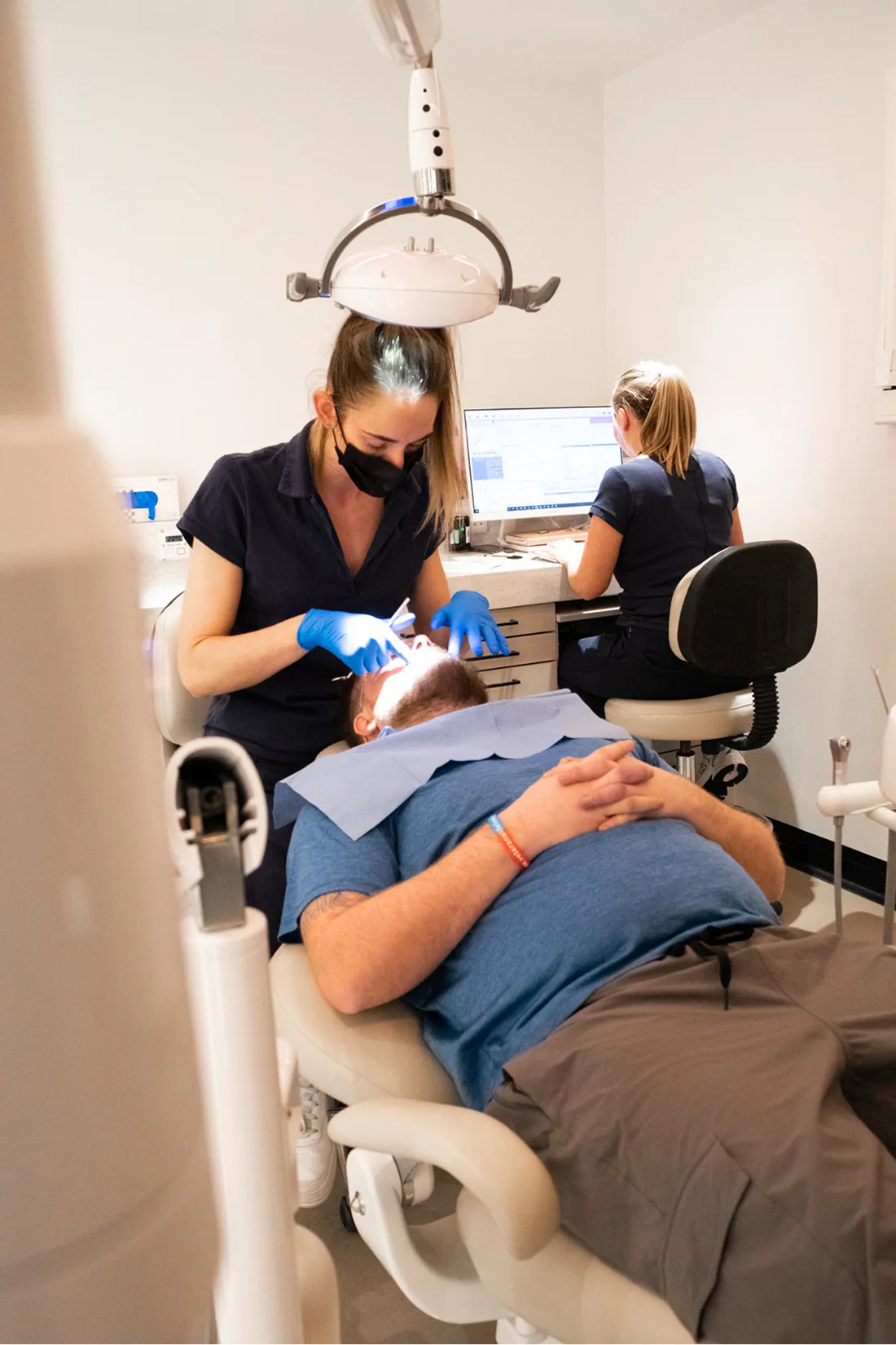
Specialist root canal treatment
It's extremely important to look after your teeth and maintain good oral hygiene. If you don't it can lead to issues such as tooth decay and gum disease, which, if left untreated, can worsen and cause more serious issues such as infections in your tooth. These infections can target parts of your teeth that are extremely important, such as the pulp and root. The root of the tooth is essential to holding the tooth in place and ensuring it remains healthy. However, there are instances where the root canal gets infected and this may be for a number of reasons. It's crucial that you get this treated as soon as possible, to lower the chance that you may lose your tooth.
These infections can be extremely painful and it's very likely that if you do have a root canal infection, you'll know about it. Swelling can occur around the tooth and jaw, as your body reacts to the infection in your tooth. Unfortunately, the tooth won't treat itself and you'll need to ensure that you take the appropriate steps to have it treated. If the issue is left untreated, it's likely that your smile will be permanently damaged. Luckily, at Dental Excellence, we have a team of experts who are able to provide you with a solution.
Relief
Alleviates toothache and discomfort by removing the infection at the source.
Preservation
Saves your natural tooth, avoiding the need for extraction.
Functionality
Restores normal biting and chewing ability.
Protection
Prevents the spread of infection to surrounding teeth and tissues.
Confidence
Helps you smile comfortably again, knowing your tooth is healthy and secure.

Who might need a root canal treatment?
At Dental Excellence, we welcome patients from across Liverpool, Chelsea, Dublin and beyond who are experiencing dental pain or infection. Root canal treatment may be recommended if the soft tissue inside your tooth (the pulp) becomes inflamed or infected, often due to deep decay, cracks, or trauma. Left untreated, this can lead to severe discomfort or even tooth loss.
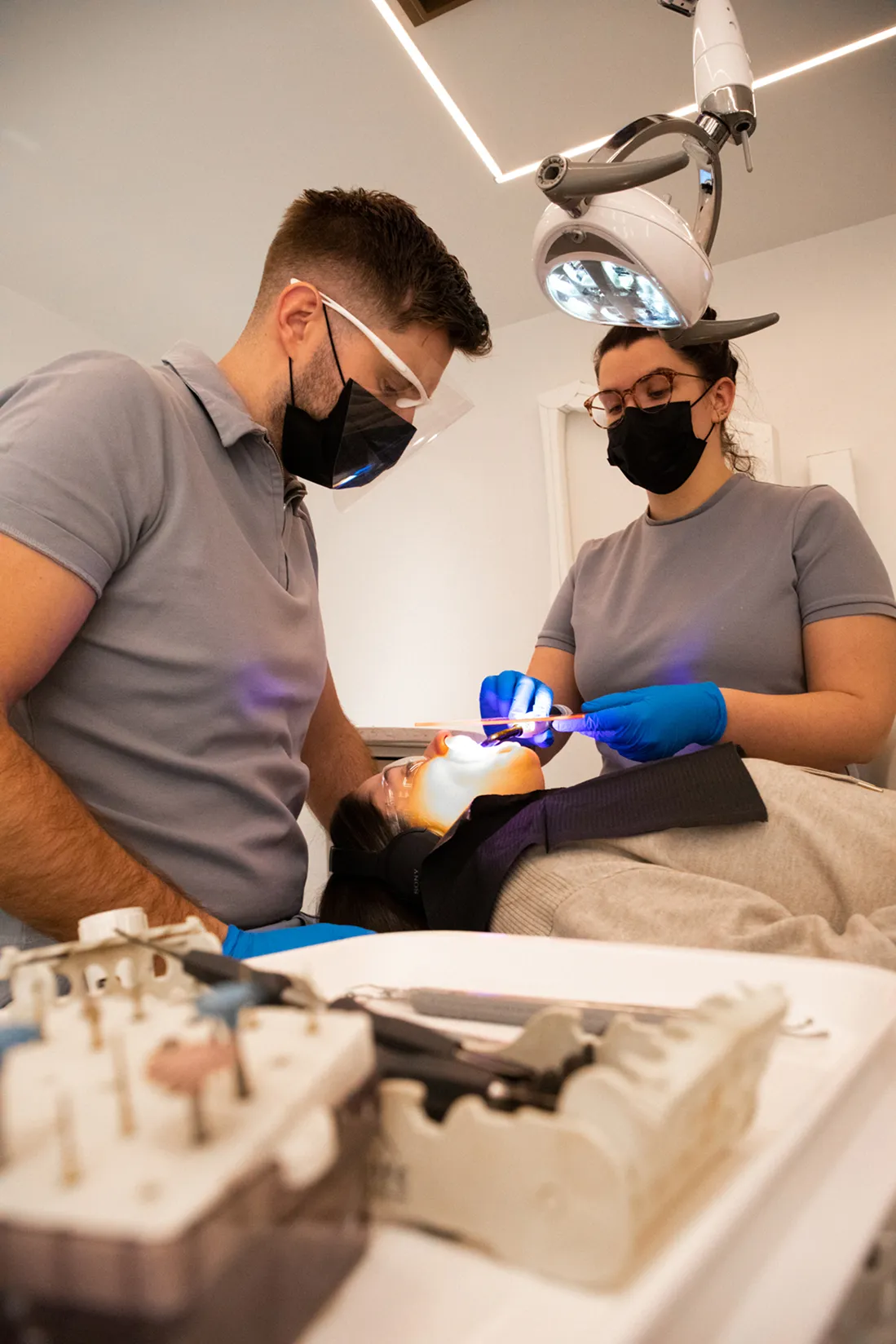




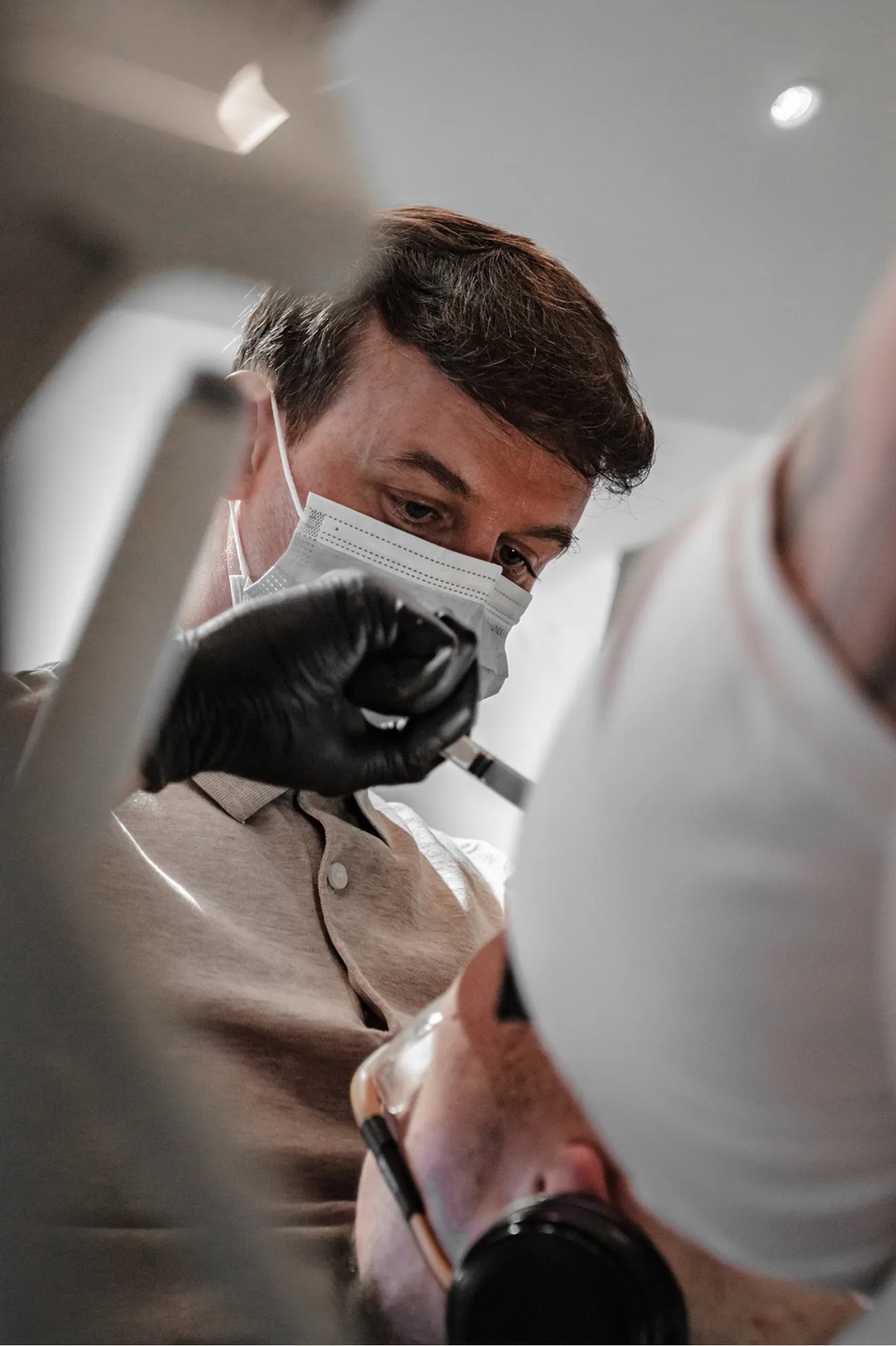
Your root canal treatment journey
Routine check-up or book an appointment
If you’re experiencing pain, discomfort, or swelling, make an appointment to see us as soon as possible. We’ll welcome you into our clinic, assess your mouth, and recommend a root canal treatment if we think it’s the best option for you.
Alternatively, if your dentist notices something during a routine check-up, they may recommend a root canal treatment.
Receiving your root canal treatment
When you have a root canal at Dental Excellence, the procedure is carried out with precision, care and your comfort in mind. First, we gently numb the area to ensure a more comfortable experience. We then remove the infected or damaged pulp from inside the tooth, carefully clean and disinfect the root canals, and seal them to prevent further infection.
Check-up appointment
In most cases, your dentist will seal your root canal treatment with a temporary filling before inviting you in to check on your progress. This ensures the infection is completely gone. Once they’re happy you’re infection-free, your dentist will usually restore your tooth using a custom-made crown or permanent filling to strengthen and protect it long term. The result is a healthy, functional tooth that looks and feels completely natural.

The Dental Excellence experience
With multiple years of experience between us, we're able to provide effective root canal treatment and will do our utmost to ensure that you're able to maintain your natural tooth. Our approach to dentistry extends far beyond simply carrying out treatments that deliver incredible results, we also value customer care and ensuring that our clients are comfortable throughout the process.
Helping with this is our luxury facilities in Liverpool and London, where we carry out our treatments. The buildings have been furnished with luxurious Italian furniture and features warm lighting to create a welcoming and relaxing environment. When suffering from the symptoms of a root canal infection, this can often increase stress and worry, especially if you have to visit a cold and clinical dental practice, which lots of patients find daunting.
Root canal and other treatments
at Dental Excellence
We offer a range of treatments here at Dental Excellence, from root canal treatment to veneers and cosmetic braces. Each treatment is designed to improve your oral hygiene and give you the perfect smile. When you begin your journey with us, we'll outline a treatment plan which is personal to you and ensure that the outcomes are exactly what you'd like. Taking care of our customers and ensuring that they're satisfied at every step of the process is extremely important to us and one of the reasons we consider ourselves the best dental practice in the UK.
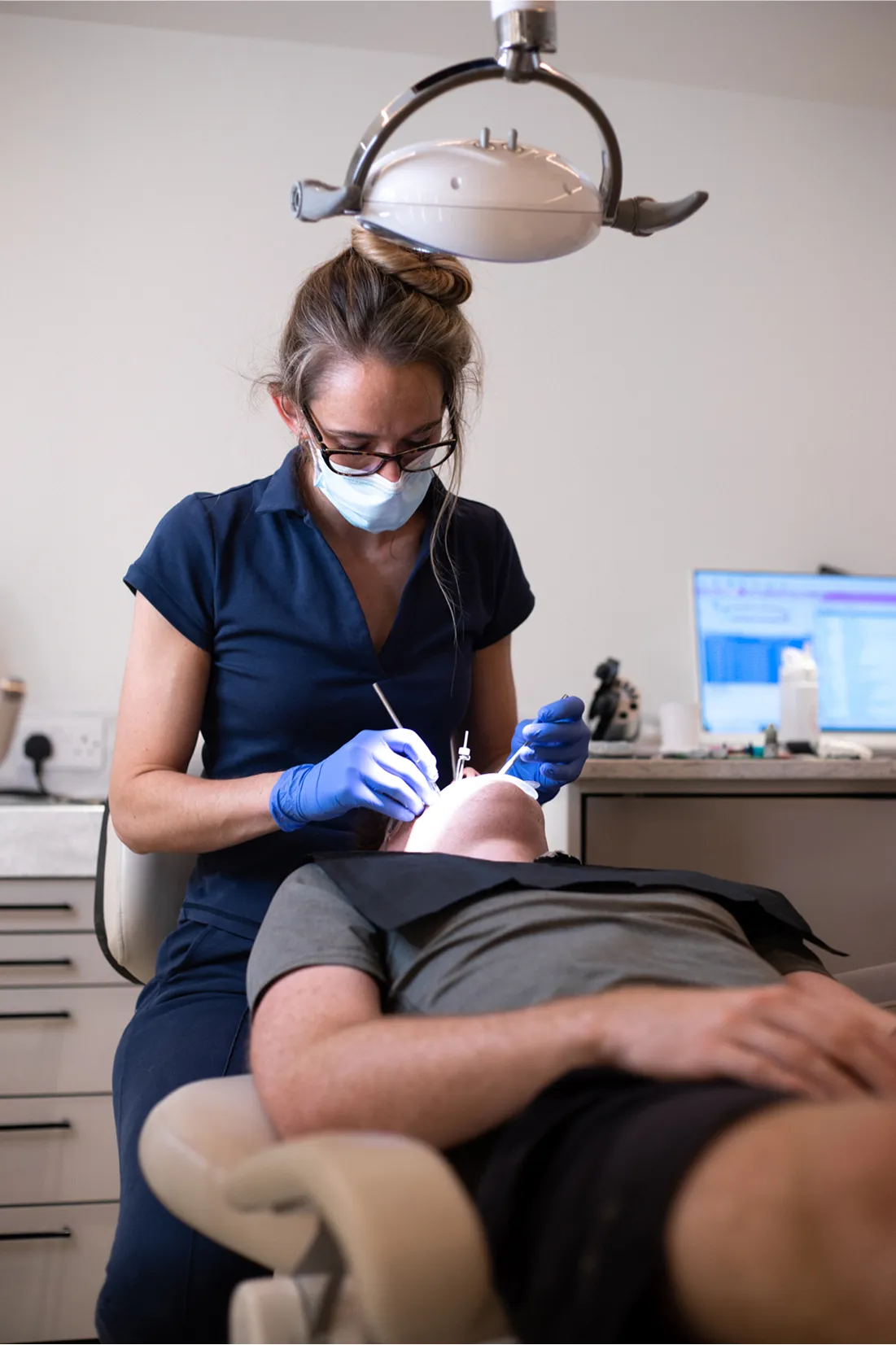

From your very first appointment with us, we'll discuss the benefits of the treatment you're looking to have and ensure you know exactly what it entails from start to finish. This part of the process can also help dispel some of your worries about the procedure, as it is often the case that patients face anxiety before treatment, due to not knowing what's involved.
Root canal treatment from
£955 per tooth
Root canal treatment at Dental Excellence is a valuable investment in your long-term oral health, with prices starting from £995 per tooth. For multiple teeth, we offer flexible finance options, including 0% interest plans, to help you spread the cost with ease.

Frequently asked questions about root canal treatment
What is root canal surgery?
Root canal surgery is a process in which the infected material, which is causing pain and damaging the tooth, is removed while keeping the tooth intact. This is done by drilling a hole into the tooth, creating access directly to the pulp tissue at the tooth canal. This infected pulp is then extracted through the hole and thus removing the infection, leaving the root canal to repair. Often the hole which has been created is treated with a temporary filling so that, in a post-surgery check-up appointment, the tooth can be checked, to ensure that the tooth is no longer infected. If a permanent filling is applied before the tooth has been assessed, it's possible that the infection could still be present, which would require another surgery to remove the remaining infected material.
Unlike the symptoms of having an infected tooth, root canal treatment is painless. Prior to surgery, an x-ray will be taken of your tooth, to identify exactly where the infection is and assess how serious the situation is. A rubber dam will also be used, which is placed around the tooth to ensure that the infection doesn't spread throughout the mouth. Before we carry out the surgery, we’ll discuss every aspect of the treatment with you and make sure you're not allergic to any of the materials we use.
Once the surgery has taken place and the infected tissue has been completely removed, the next step is effective aftercare. As the procedure can be quite invasive and intense, especially on the tooth which has received the root canal treatment, it's important you look after it. There are cases where, if the tooth is too worn or damaged as a result of the infection, a crown may need to be fitted on the tooth. A crown is essentially a cap that fits over your tooth in order to protect it and ensure it retains its structural integrity. If it's one of your back teeth which has been treated, this will increase the chance that you'll need a crown as these teeth are used for chewing. Fortunately, we also offer crowns here at Dental Excellence, meaning you can receive this part of the treatment at our facility too.
Initially, once the treatment is complete, your face will still be numb as it can take a few hours for the anaesthetic to wear off. There's also potential for there to be pain for a few days after the surgery, whilst your mouth properly heals. In addition to this, it's extremely important that you keep your mouth clean and maintain good dental hygiene. You should also be careful when consuming sugary foods and drinks, as these can accelerate tooth decay. In serious cases, this could lead back to square one, with another infection developing in your tooth. Our team here at Dental Excellence is also on hand to help with any issues or questions you have post-treatment to ensure your recovery is as quick as possible.
There's also the chance that you will be required to attend post-surgery appointments so that your recovery progress can be checked. This will include an assessment of the tooth and x-rays to gain a clear understanding of the state of the tooth. If issues such as cracks or other types of decay have occurred, there's a chance you may need to have further treatment. You will be advised to look after your teeth in a number of ways post-treatment, including brushing your teeth thoroughly and regularly, to prevent bacteria from forming around the tooth. Using mouthwash and floss is also extremely important (and you should use this as part of your normal dental care routine anyway). Cutting down on foods that are particularly sugary or high in acidic content is another important step as this can help protect the tooth.
There are, of course, risks involved with the treatment, as there are in any surgery, which is why it's important to seek treatment from a clinic with a good reputation and a skilled team. Complications that can occur as a result of the treatment include damage to the canal or the tissue in the surrounding area, infection as a result of the treatment, or nerve damage. Our expertise, top-quality equipment and sterile facility help reduce the chance of any of these issues occurring, but it's important you're aware of the risks before undergoing the surgery.
We're always transparent about costs to ensure you can budget effectively. Our root canal treatment will cost between £575 - £865, depending on the complexity. A crown will cost £800 per tooth and if you need to have a tooth extracted, this will cost £145+ but the price is again dependent on the tooth. Once we begin planning the procedure and have appointments to outline your treatment plan, we'll be able to give you a much more accurate idea of costs.
What causes root canal infections?
There are a range of issues that can lead to root canal infections, so it would be impossible to narrow it down to a single cause. There are also a range of ways that these issues can be caused but maintaining a high standard of dental hygiene is a good place to start.
Often, one of the most common causes of root canal issues is if tooth decay has been left untreated. This can lead to the situation worsening, damaging large parts of the tooth and leaving the pulp cavity and root canal susceptible to infection. Tooth decay is completely preventable, too; by brushing your teeth properly and using floss, you're able to remove plaque buildup from your teeth and prevent decay. You can also receive fillings if the decay has already damaged your tooth, which will reduce the chance of the damaged area leading to serious infection.
Cracked teeth are another serious issue that can lead to root canal infections or damage. Teeth can become cracked due to a number of things, including sports injuries, biting too hard, grinding your teeth or accidents. This can also create different types of cracks, such as one main crack or multiple smaller ones. Both of these types of cracks can cause serious damage and will need to be treated as soon as possible to prevent the situation from worsening. If you have smaller cracks in your teeth it may be difficult to see as they're often not very visible. However, one key way to tell is if you feel discomfort, especially when eating or when subject to cold or hot temperatures.
A cracked tooth can leave the tooth susceptible to infection due to the inner tooth being exposed. It can also cause other issues as a result of the crack, such as blood vessels or soft tissue becoming damaged. This will require a dental procedure to be fixed, however, if it's left for too long, it can lead to tooth loss. Depending on the severity of the crack and whether or not the pulp inside the tooth is damaged, you may need a root canal procedure. This can lead to your tooth being saved, though, as the procedure will ensure any damaged tissue won't get infected, and the crack will then be filled to improve the structure of the tooth. Depending on the severity of the crack, you may be required to have a crown fitted to prevent a crack from occurring again.
If you've previously had a crack or severe tooth decay and had a filling, there is potential that this could become infected if it cracks or becomes loose. This is due to a previously damaged part of the tooth becoming exposed, giving bacteria a chance to target the root canal area. An injury could also cause this; if you've been hit during sports or by accident, this could potentially loosen the filling or damage the tooth directly. This could lead to nerve tissue becoming damaged, which would cause severe pain and result in infected tooth pulp which will need to be extracted. If you've had multiple treatments on a single tooth, this could also increase the chance of the tooth becoming infected.
If there has been an issue with your tooth and you were looking to receive dental treatment but weren't able to receive any in a quick enough time, you may need to have your tooth removed. Although we'll do our best to preserve your tooth, if it does need to be removed, we can complete this procedure at our facility. We can also fit dental implants to replace the tooth which has been extracted, to ensure you don't have to contend with a missing tooth. Dental implants are a great option for repairing your smile if you're missing a tooth. This is especially the case if you've had a painful or unhealthy tooth as it can be replaced with an artificial tooth that won't cause your pain and will still be able to perform the job it needs to. There is also the likelihood that the tooth has been damaged or is dead, leading to loss of the white colour, which means that when it's replaced with an implant that you can enjoy a whiter colour.
You may also be wondering what happens if you get an infection in your root canal. One of the key indicators will be pain as it will likely make eating difficult, especially when chewing solid foods. Swelling will also occur, which could also hinder eating and brushing your teeth. This can be dangerous, however, as you may be reluctant to brush your teeth properly, which will allow more bacteria to gather. This will lead to the situation worsening and if you haven't got it already, could lead to gum disease. Gingivitis is also a cause of root canal infections, so this would only worsen the situation and increase the chance of tooth loss.
If you suspect you may have a root canal infection, it's important that you look out for any of the signs which may reveal the issue and also ensure you act when you can. If you're unsure, you should seek a checkup anyway, as there are cases when you may not know about the issue until it worsens. This improves your chance of catching the infection early on, which could save your nerves and surrounding tissue before they become damaged. The infection can also spread, given time, so the sooner you catch it, the less intensive the root canal surgery will be, as there is less infected tissue to remove.
At Dental Excellence, we pride ourselves on being able to offer solutions to dental issues, leading to your life being changed for the better. Even if the issue is serious, such as a root canal infection or a decaying tooth that needs removing, we can help and provide treatment that will repair your smile. Our expertise and incredible technology, which is available to us at our state-of-the-art facility, is what allows us to carry out these life-changing procedures for a range of clients.
How long does it take to heal after a root canal treatment?
Most patients experience mild tenderness or sensitivity in the days following treatment, which usually subsides within a week and can be managed with over-the-counter pain relief. You can typically return to your normal routine the same day. While the surface healing is quick, the internal healing of the tooth continues gradually over the following weeks. If your tooth is being restored with a crown, we’ll schedule a follow-up to complete the process and ensure long-term strength and protection.
Will I need a crown after a root canal treatment?
In many cases, especially for back teeth, a crown is recommended after a root canal to restore strength, function and protect the tooth from future damage. Your dentist will assess your individual case and advise on the best way to preserve your tooth long term.

